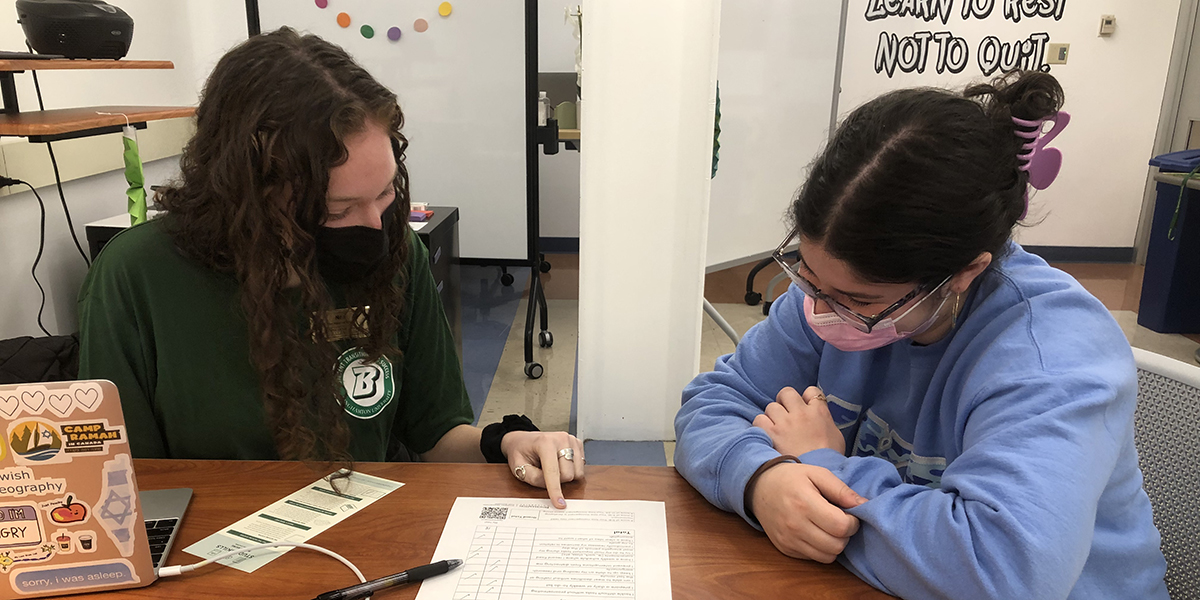Success coaches guide peers in navigating college life and academics

When Noa Popky came to Binghamton as a first-year student, she knew that she wanted to start college off on the right foot. So she attended peer success coaching for academic help. Now she is passing along the knowledge and insights she gained from those sessions to her peers, working as a success coach herself.
Success coaching is offered through the Office of Student Transition and Success. Through the program, peer and professional success coaches meet with undergraduate students in one-on-one appointments. Coaches are trained to identify potential barriers to academic success and work together with students to create tailored interventions on topics like organization, time management, goal setting and more. They also provide weekly supportive accountability groups, workshops and access to virtual resources.
Popky, now a junior majoring in psychology, first decided to attend success coaching after hearing about it in a class and realizing that the methods of organization that she was always taught didn’t quite work for her in her new college life.
“I got really involved on campus early on and I was like, I have so many things and I don’t know how to organize myself,” Popky said. “I bought a planner, but I was never checking it and it just wasn’t working for me.”
Through working with her peer success coach, Popky learned how to use online tools like Google Calendar and Tasks, which she says still help her organize and make sense of her busy schedule.
“Everything is now combined in one spot, and I preach it to everyone that comes [to success coaching],” Popky said. “[My success coach] helped me figure out what works for me in juggling all these clubs that I was joining with my classes, social life and this new life coming into college that I wasn’t used to.”
After her positive experiences with being coached, Popky decided to join the team, and has worked as a success coach since fall 2021.
Lauren Morris, the assistant director of student success coaching, said that Popky’s success as a peer coach stems from her personal experience struggling to manage the transition to college and her passion for helping others.
“Noa is very special and unique,” Morris said. “She connects really well with the students. She’s always getting out there and speaking on behalf of success coaching in a positive light, and we were really excited to bring her on.”
Morris believes that the goal of success coaching is for students to feel as good in finals week as they do during syllabus week, and that the best way to achieve that is by having peer coaches to help students keep themselves motivated and able to hold themselves accountable in ways that are specific to and tailored to each of them personally.
“[Peer success coaches] have this unique vision that I don’t have of literally going through it currently and also figuring out some things that might work for them, might work for specific majors,” Morris said. “I was an art major in college, so my time and task management looked very different from someone studying business. We try to hire peer coaches who have a diverse set of backgrounds and majors.”
Popky understands the predicaments that fellow students find themselves in that are specific to the nuances of the college landscape over the past two years.
After the sudden transition to virtual learning in March of 2020, and the transition back to in-person classes this year, some students have had to learn completely new methods of time management and organization, which can feel confusing, overwhelming and exhausting.
“The burnout that we’ve experienced from COVID has really taken a toll on everyone,” Popky said. “I work with students to make calendars and figure out a timeline of things, but sometimes we can’t always do everything we say we’re going to do. [You have to] readjust your schedule and not let yourself fall behind. We’re using our bodies so much more, we’re exhausting ourselves and we’re really letting things slip through the cracks. A calendar isn’t set in stone — it changes, and you have to be willing to change with it and to listen to yourself and what you need.”

